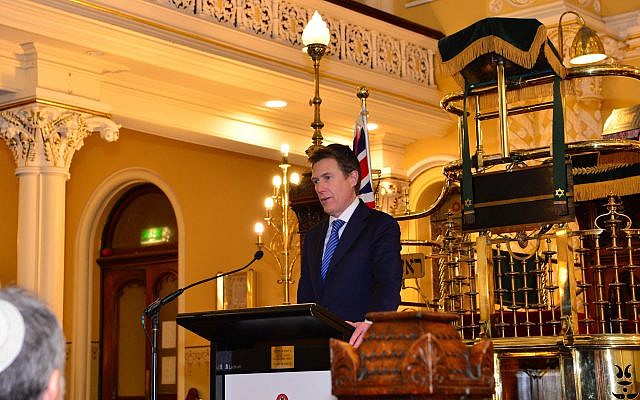New protections against religious discrimination
Attorney-General Christian Porter outlined the new legislation to religious leaders, community groups and media at Sydney's Great Synagogue last Thursday.

UNDER the federal government’s draft Religious Discrimination Act released last week, NSW Jewish Board of Deputies CEO Vic Alhadeff could have argued his exclusion from a multicultural Labor event in August 2018 was discrimination on religious grounds.
Attorney-General Christian Porter outlined the new legislation to religious leaders, community groups and media at Sydney’s Great Synagogue last Thursday.
Using the incident in which Alhadeff was refused entry by state MP Shaoquett Moselmane as an example, Porter said people would be protected against a range of “real life incursions by the specific protections in the bill”.
“[Alhadeff] was refused entry because of the religiosity of his position. Everyone would agree this is totally unacceptable,” he said.
“That exclusionary conduct was clearly malicious and vindictive, but in NSW without this act there would be no avenue for Mr Alhadeff, if he were minded, to argue this was unlawful discrimination on the basis of his religion.”
The legislation, which follows the federal government’s Ruddock Review into Religious Freedom conducted last year, will create a new office of the Freedom of Religion Commissioner in the Australian Human Rights Commission.
The result of “extensive consultation”, Porter said it will provide comprehensive protection against discrimination on the basis of religious belief or activity.
The act also sets out what it does not consider discrimination, such as religious schools and charities “engaging, in good faith, in conduct that may reasonably be regarded as being in accordance with the doctrines, tenets, beliefs or teachings of the religion”.
According to an Executive Council of Australian Jewry (ECAJ) analysis, Jewish day schools “would be free to continue operating in accordance with their religious beliefs in all their operations – including enrolment of students, employment practices, and the hiring out of facilities – without this being considered discriminatory”.
But Australian Council of Jewish Schools (ACJS) co-chair Justice Stephen Rothman said ACJS did not share ECAJ’s confidence about this protection, noting it was unclear according to the Bill if preschools or creches were defined as educational institutions.
He added, “If there is no doctrine, tenant, belief or teaching that requires Jewish students to learn only with other Jewish students, it would seem that a Jewish school could not confine its enrolment to members of the Jewish faith”, calling the lack of clarification “troubling”.
But he said, “We do not believe the Government intended such a bizarre result and we will be taking these and other matters up with the relevant minister or department.”
This protection does not apply to aged care facilities, which the legislation considers to be engaging in commercial activities.
There are also protections for people of faith in the workplace. The bill would consider it “indirect discrimination” and therefore unlawful if an employer made it a condition for all employees to attend Friday afternoon meetings when observant Jews would be leaving early for Shabbat.
Employer dress codes are required to be “reasonable” and not prohibit religious dress unless it is a job requirement.
Elsewhere, the bill provides that a statement of religious belief, such as quoting the section of the Torah that forbids homosexuality, does not constitute discrimination.
ECAJ did identify areas which it said require further clarification, one being the reasonableness test of what is “in accordance with doctrines, tenets, beliefs or teachings of the religion”.
ECAJ also said the bill’s use of the wording “lawful religious activity”, while reasonable on the surface, could hypothetically become problematic.
“The lawfulness or otherwise will be gauged at the time that the person was allegedly discriminated against,” ECAJ said.
“If that is so, then if at some future time shechita and brit milah were to become unlawful, it would then be permissible to discriminate against Jews on the basis that they had previously eaten kosher meat, or participated in a brit milah ceremony, even if at the time they had done so such activities were lawful.”
ECAJ has also called for the Australian Law Reform Commission’s Report into the Framework of Religious Exemptions in Anti-Discrimination Legislation to be released as early as possible.
The Attorney-General expects a final draft bill will be presented to federal Parliament in October.
Submissions on the draft bill can be made at https://www.ag.gov.au/Consultations/Pages/religious-freedom-bills.aspx and close on October 2. Jewish community members can email their comments to ECAJ, info@ecaj.org.au by September 16.

comments